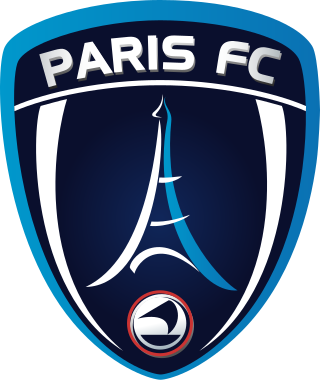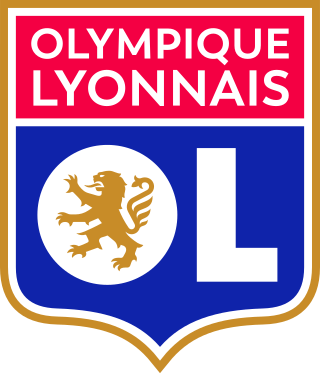
The France women's national football team represents France in international women's football. The team is directed by the French Football Federation (FFF). France competes as a member of UEFA in various international football tournaments such as the FIFA Women's World Cup, UEFA Women's Euro, the Summer Olympics, and the Algarve Cup.

The Première Ligue is a professional women's association football league at the highest level of the French football league system, and is run by the Ligue féminine de football professionnel (LFFP). Its annual competition features twelve teams playing two series of round-robin matches from September to June, to determine the four participants of a single-elimination tournament. The winners of the tournament are crowned champions of France, and contest the Trophée des Championnes match the following season. At the end of each season, the top three teams qualify for the UEFA Women's Champions League, while the bottom two teams are relegated to the Seconde Ligue.

Reynald Michel Sebastian Pedros is a French professional football manager and former player who played as a midfielder. He recently managed the Morocco women's national team.

Paris FC is a French women's football club based in Viry-Châtillon, a suburb of Paris. The club is the female section of Ligue 2 men's club Paris FC. The club was founded in 1971 and currently play in the Première Ligue, the first division of women's football in France. The club has played in the first division since 1987.

Olympique Lyonnais Féminin is a French women's professional football club based in Lyon. The club has been the female section of Olympique Lyonnais since 2004. It is the most successful club in the history of the Première Ligue, with seventeen league titles as Olympique Lyonnais and four league titles as FC Lyon before the acquisition.

Camille Anne Françoise Abily is a French football manager and former player, who featured prominently for both the France women's national team and for Lyon in the Division 1 Féminine. She currently is the assistant manager of Chelsea.

Louisa Nécib Cadamuro is a French former professional footballer who played for the France national team. She spent the majority of her career at Lyon, amassing eighteen titles with the French club over a nine-year span. She played as a attacking midfielder and was described as a "gifted playmaker" who "possesses superb technique". Nécib is also known for her "elegant possession, sublime passing skills, and cultured touch on the ball".

Élodie Ginette Thomis is a French former football player who played for French club Lyon of the Division 1 Féminine. She played either a winger or striker and was described as a player who possesses pace comparable to that of French men's internationals Thierry Henry and Sidney Govou. Thomis is a graduate of the women's section of the Clairefontaine academy and was a French women's international having made her debut with the team in June 2005 at UEFA Women's Euro 2005 against Italy.

Laura Stéphanie Georges is a French retired footballer who is the Secretary General of the French Football Federation. She last played for German club Bayern Munich of the Bundesliga, and served as the first-choice captain of her club and played primarily as a central defender, but was also used as a defensive midfielder. Georges was also a France women's international having made her senior international debut in September 2001. She represented her nation at seven major international tournaments; the 2003, 2011 and 2015 editions of the FIFA Women's World Cup and the 2005, 2009, 2013 and 2017 editions of the UEFA Women's Championship.

Sonia Bompastor is a French football manager and former player who currently manages Chelsea of the English Women's Super League. She is the first person to win the UEFA Women's Champions League as both a player and a manager.

Paris Saint-Germain Football Club, commonly referred to as Paris Saint-Germain or simply PSG, are a French professional women's football club based in Paris. Founded in 1971, they compete in the Première Ligue, the top division of French football. Their home ground is the Stade Jean-Bouin. They are the women's department of Paris Saint-Germain.

Sandrine Soubeyrand is a French former footballer and current coach of Paris FC (women). She played as a midfielder for France national team, Félines Saint-Cyr, Caluire and Juvisy.
Sabrina Marie-Christine Viguier is a retired French football player. She played as a centre back and has played for the France women's national football team making her debut in 2000. She last played for IF Limhamn Bunkeflo Malmö of the Elitettan until she announced her retirement from football in 2017. She has won the UEFA Women's Champions League twice with Olympique Lyonnais in 2011 and 2012.

Eugénie Anne Claudine Le Sommer-Dariel is a French professional footballer who plays as a forward for French club Lyon and the France national team. She primarily plays as a creative attacking midfielder and left winger, but has also played as a second striker for her country.
The Paris Saint-Germain Academy is the youth system of both Paris Saint-Germain's men's and women's teams. Managed by the Association Paris Saint-Germain, the academy was officially established in 1975, but has been developing young talents since the club's foundation in 1970. The academy now has centres in several countries around the world. Likewise, PSG began developing youth players for the women's section in 2012, with the academy officially opening in 2023. Campus PSG in Poissy is currently the training facility and home ground of both sections.

Amel Majri is a professional footballer who plays as a winger and left-back for Première Ligue club Lyon and the France national team. With Lyon, she has won thirteen league titles and eight UEFA Women's Champions League titles.

Kadidiatou Diani is a French professional footballer who plays as a forward for Première Ligue club Lyon and the France national team.
Melchie Daëlle Dumornay, also known as Corventina, is a Haitian professional footballer who plays as a midfielder for Première Ligue club Lyon and the Haiti national team.

The Fédération des sociétés féminines sportives de France was a French organisation set up to promote women's sport. The FSFSF was responsible for the French women's football championship from 1919 until 1932, and organised the Women's Olympiad, an alternative to the Olympic Games, between 1921 and 1923.
Alice Dauphine Sombath is a French professional footballer who plays as a right-back for Division 1 Féminine club Lyon.
















